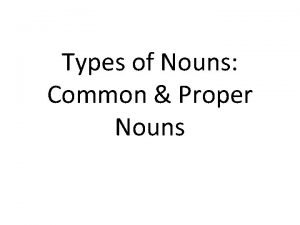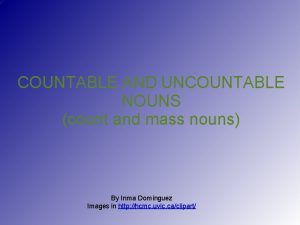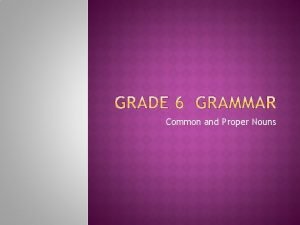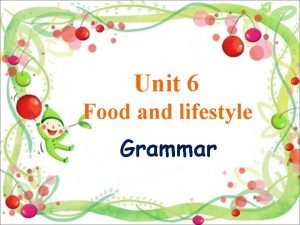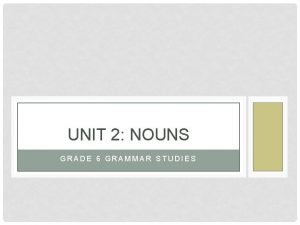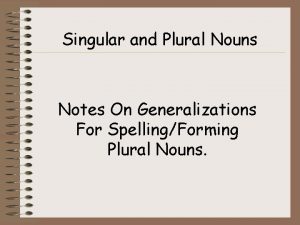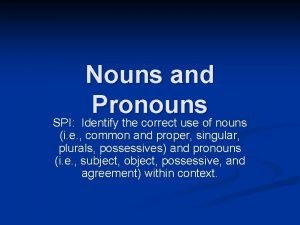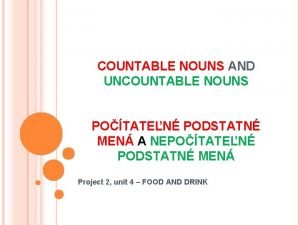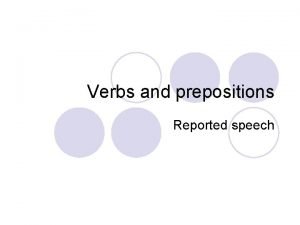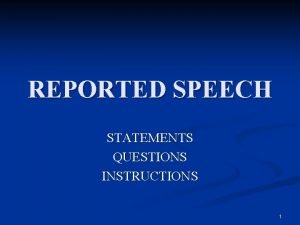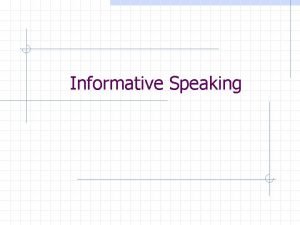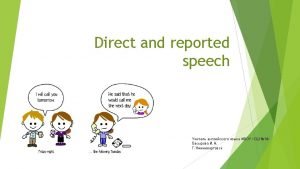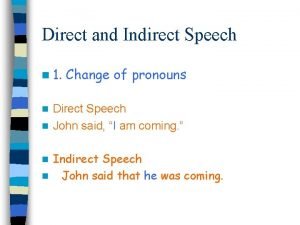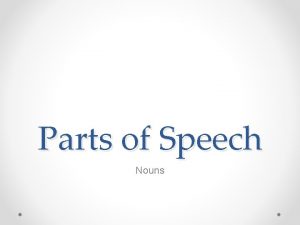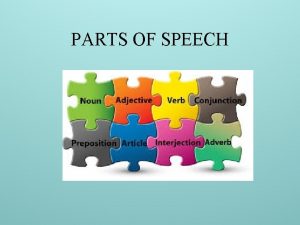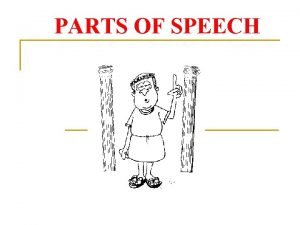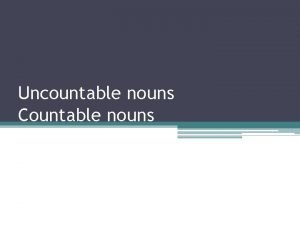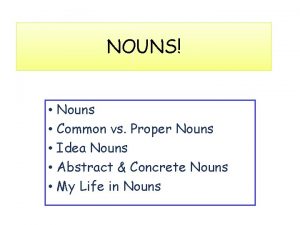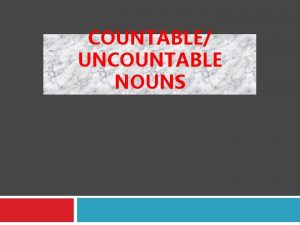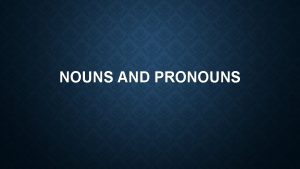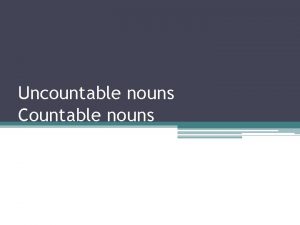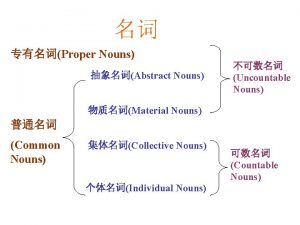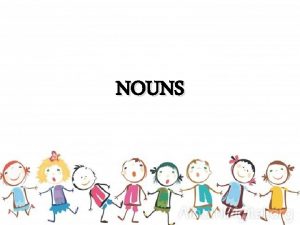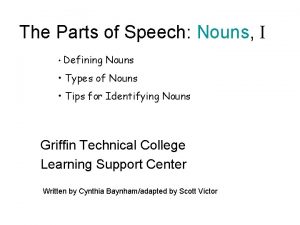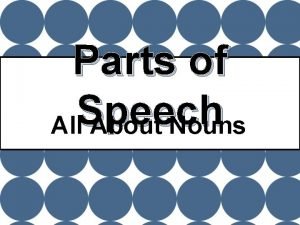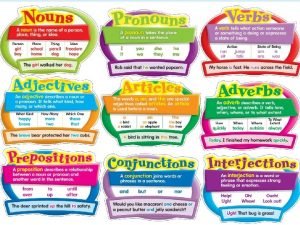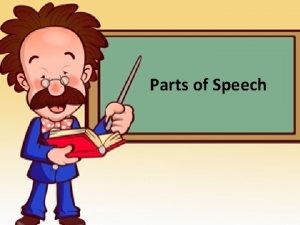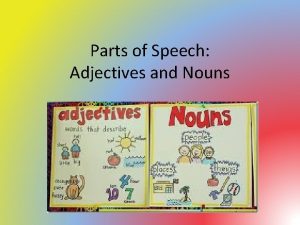Parts of Speech Nouns Nouns Nouns are words



















- Slides: 19

Parts of Speech Nouns

Nouns • Nouns are words used to name persons, animals, places, things, or abstract ideas, including concepts and qualities • Anything you can see, hear, touch, taste, or smell is a noun

Examples • • • Poet Concert Surface Tomatoes Smoke

Conceptual nouns • • Loyalty Popularity Achievement Anger Afterthought Justification Neatness

Common Noun endings • • -ness (Kindness, willingness) -ment (excitement, engagement) -cation (vacation, citation, explanation) -ty (accessibility, security, proclivity)

Example in a Sentence • Statistically, teachers expect more attractive children to perform well, leading to more attention, less punishment, and better grades. • Red= noun • Underline= verb

Example in a sentence • The actor Robert Pattison seems a very believable vampire because he is pasty.

Pronouns • Replace nouns or other pronouns in order to make sentences less cumbersome and less repetitive. • There are 7 types of pronouns

Personal Pronouns • Refer to specific persons or things • • • They are: I, me You He, him, she, her, it We, us They, them

Examples of personal pronouns • • Stephanie is a wonderful tutor. She is a wonderful tutor The dog is her best friend. We are going to learn grammar if it kills us.

Possessive Pronoun • • • My, mine Your, yours His, hers, its Our, ours Their, theirs

Reflexive/Intensive Pronouns • • • Myself, yourself Himself, herself, itself Ourselves Yourselves Themselves

Demonstrative Pronouns • -point out a particular person or thing • • This These That Those

Interrogative Pronouns • Are used to ask question • • • Whom Which What Whose

Relative Pronouns • Used to introduce subordinate clauses • • • Whom Whose Which That

Examples of Relative Pronouns • The festival, that lasted all day, ended with a banquet. • I am looking for someone who can watch my dog while I go on vacation. • The police needed details that could help identify the robber.

Indefinite Pronouns • Refer, generally, not specifically, to persons, places or things. • A few examples: • All, anybody, both, each, either, everybody, few, many, neither, none, one several, somebody

Identifying Pronouns • Somebody (indef) once said that you (per) should look at the world the same way an optimist does, because he or she (per) always sees the positive possibilities in any situation.

Identifying Pronouns • Some psychologists argue that people often fall in love with someone (indef) who (rel) is similar to the parent with whom (rel) they (per) have unresolved childhood issues, unaware they (per) are seeking to resolve this childhood relationship in adulthood.
 Antigentest åre
Antigentest åre Table uncountable nouns
Table uncountable nouns Shelf is common or proper noun
Shelf is common or proper noun Park countable or uncountable
Park countable or uncountable Proper noun of city
Proper noun of city Four tomatoes
Four tomatoes Grammar unit 2
Grammar unit 2 Singular plural number
Singular plural number Count nouns and noncount nouns
Count nouns and noncount nouns Abrigo es singular o plural
Abrigo es singular o plural Common noun
Common noun Countable nouns
Countable nouns Match these sentences in direct and reported speech
Match these sentences in direct and reported speech Pure speech definition
Pure speech definition Poem speech to the young
Poem speech to the young Reported speech statements and questions
Reported speech statements and questions Informative vs persuasive
Informative vs persuasive Direct present simple
Direct present simple Examples of direct speech
Examples of direct speech Reported speech examples with answers
Reported speech examples with answers


